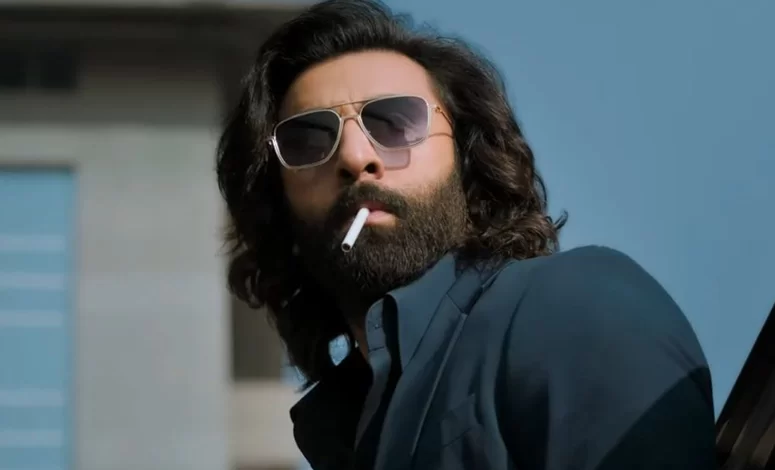At the heart of Sandeep Reddy Vanga’s new film Animal is unrequited love: that between an uncaring construction magnate Balbir (Anil Kapoor) and his hopelessly obsessed, perennially teenage son Ranvijay (Ranbir Kapoor, who seems drawn to the subject of one-sided romance). Ranvijay’s obsession with his father metastasizes into world-burning psychosis when there’s an attempt on Balbir’s life. Animal is a sprawling rampage by an inconsolable character at war with the world and himself, filled with ultraviolent set pieces, but one that pushes past the formulas of contemporary pan-Indian actioners to get into sticky territories of its own making. Since I watched the film after it had made so much noise, I wasn’t shocked or unsettled by any of its provocations or excesses. I rather admired its passionate bravado, its stunningly abrupt detours, its taste for self-sabotage. I’ve seen nothing quite like it in Indian cinema.
Vanga seems to have responded to the criticisms levelled against his first film, Arjun Reddy (2017), not by digging in his heels, as several commentators have suggested, but by taking a step back. Where Arjun Reddy positioned its lead character as a textbook stud whose appeal is evident if qualified, Animal takes pains to mark out Ranvijay as an exception, a pathological example to be gawked at like a train wreck. Rarely has a Hindi film been so nakedly, laughably Freudian, with every action of Ranvijay’s — his murderous outbursts to his solicitousness towards his sisters to even his marital infidelity — explained away as symptoms of his unresolved daddy fixation. Not even the most ardent admirer of Arjun Reddy will come out of Animal wanting to emulate Ranvijay.
Like Arjun, Ranvijay is a Capital-R Romantic, a guy who knows his girl will break off her engagement to another man and return to him running, one who will make love to her on a private plane and marry her the following day on a hill temple. I choked on my saliva when a teenage Ranvijay brings in a machine gun to a classroom to threaten his sister’s bullies. But after Animal reaches a paroxysm of alpha-male fantasy in a gala mid-movie shootout, it turns itself inside out. Vanga’s film heads off in a new direction no less than three times after its interval. In the first of these restarts, it catapults us from the adrenaline rush of all the bloody mayhem into the sedate sordidness of Ranvijay’s domestic life. Sporting a paunch, Ranvijay is now the source as well as the butt of awkward jokes about his semi-vegetative state.
It is in this section that the film anthologizes most of the outrageous behaviour that has been taken apart by critics: Ranvijay snapping his wife’s bra strap as a twisted come-on (but the film hardly shows the gesture itself), having her remove her clothes in the living room (but the camera shifts focus to the maid in the background, complicating our response), giving her solemn lectures about his incontinence (but filmed from above the staircase under the gaze of his men, Ranvijay cuts but a sorry figure) and so on. Commentators have repeatedly enumerated these actions, presenting them as self-evident proofs of the film’s depravation, short-circuiting the necessary hierarchy between content, intent and effect.
But the film presents these seedy episodes as the exact obverse of Ranvijay’s brash individualism, his capital-R Romanticism. In Animal, the impulsiveness that makes a man love a woman among the clouds or on an airstrip is the same one that prompts him to make weird underwear jokes or commission a Rolls Royce the colour of his lover’s hickeys or strangle an enemy with his bare hands. As much as Bollywood likes to present a sanitized myth of the soft romantic hero, all this behaviour, Vanga’s film advances, is of a piece. In doing so, Animal clears any remaining ambiguity around Arjun Reddy, deconstructing alpha-male existence as being motored by beta-male insecurities. This is a film that introduces his hero, like Arjun Reddy, through wisps of glamorous smoke, but leaves him a crying mess.
Not that there is a shortage of calculated provocations or queasy writing choices. The prelude is a gratuitous come-get-me, and the film doesn’t seem to be sure where to end exactly, chaining together half-a-dozen scenes, serious and funny, corny and thrilling, before the lights come up. Geetanjali, the character played by Rashmika Mandanna, gets one of the meatiest scenes in the film, but in all others, she is a two-bit character switching moods at the drop of a hat, or a top. Tripti Dimri is the star of the film’s most tedious detour, from which it takes a while to recover. But for the most part, the film remains true to the character of Ranvijay, played with a ferocious intensity by Ranbir Kapoor, who keeps the film together even with a host of tentative secondary performances.
Although its analysis may be simplistic, it perhaps needed Animal for Hindi cinema to show up Northern India’s “baap baap hota hai” obsession as the sign of a foundational corruption. There have been dysfunctional dads galore in Bollywood, but I can’t think of many films in which filial veneration is framed as a chronic disease, as something less than an unqualified virtue. Like Arjun Reddy, Ranvijay embodies certain attractive modern ideals, at least to the degree that he can be empathized with: a kind of brute gender equality that belies his primitivism, caste blindness, religious scepticism and a pervasive non-conformism. And like him, the film is volatile and unpredictable, refusing to conform to the norms of mainstream storytelling, or doing so in its own particular way, or failing on its own terms while attempting to do so. Imitation is perhaps the last thing the film can be charged with. I’m reminded of a joke about a minister and a monkey.
